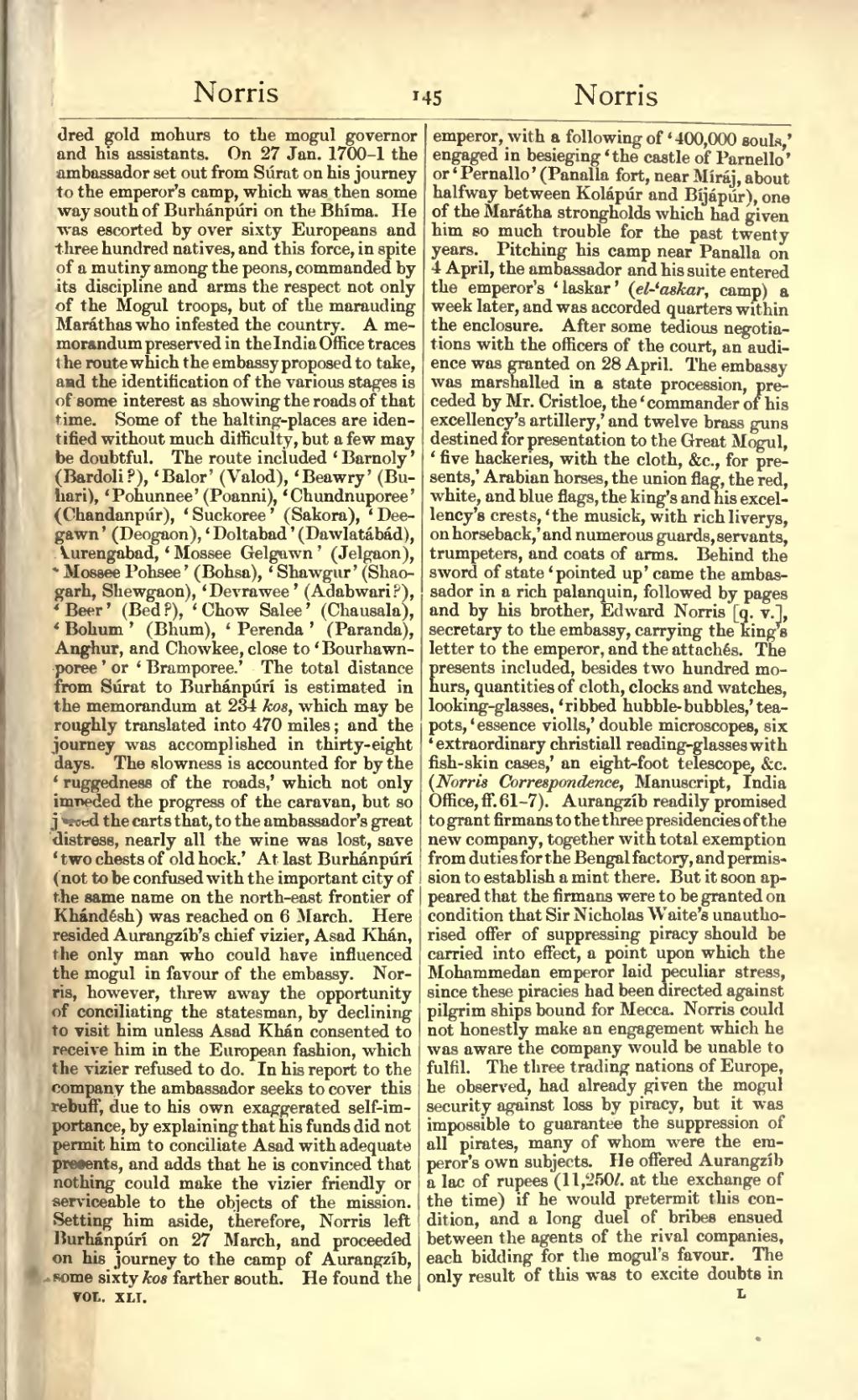dred gold mohurs to the mogul governor and his assistants. On 27 Jan. 1700-1 the ambassador set out from Súrat on his journey to the emperor's camp, which was then some way south of Burhánpúri on the Bhíma. He was escorted by over sixty Europeans and three hundred natives, and this force, in spite of a mutiny among the peons, commanded by its discipline and arms the respect not only of the Mogul troops, but of the marauding Maráthas who infested the country. A memorandum preserved in the India Office traces the route which the embassy proposed to take, and the identification of the various stages is of some interest as showing the roads of that time. Some of the halting-places are identified without much difficulty, but a few may be doubtful. The route included 'Barnoly' (Bardoli?), 'Balor' (Valod), 'Beawry' (Buhari), 'Pohunnee' (Poanni), 'Chundnuporee' (Chandanpúr), 'Suckoree ' (Sakora), 'Deegawn' (Deogaon), 'Doltabad' (Dawlatabad), Vurengabad, 'Mossee Gelgewn' (Jelgaon), 'Mossee Pohsee' (Bohsa), 'Shawgur' (Shaogarh, Shewgaon), 'Devrawee' (Adabwari?), 'Beer' (Bed?), 'Chow Salee' (Chausala), 'Bohum' (Bhum), 'Perenda' (Paranda), Anghur, and Chowkee, close to 'Bourhawnporee ' or 'Bramporee.' The total distance from Súrat to Burhánpúri is estimated in the memorandum at 234 kos, which may be roughly translated into 470 miles; and the journey was accomplished in thirty-eight days. The slowness is accounted for by the 'ruggedness of the roads,' which not only impeded the progress of the caravan, but so jolted the carts that, to the ambassador's great distress, nearly all the wine was lost, save 'two chests of old hock.' At last Burhánpúrí (not to be confused with the important city of the same name on the north-east frontier of Khandesh) was reached on 6 March. Here resided Aurangzíb's chief vizier, Asad Khan, the only man who could have influenced the mogul in favour of the embassy. Norris, however, threw away the opportunity of conciliating the statesman, by declining to visit him unless Asad Khan consented to receive him in the European fashion, which the vizier refused to do. In his report to the company the ambassador seeks to cover this rebuff, due to his own exaggerated self-importance, by explaining that his funds did not permit him to conciliate Asad with adequate presents, and adds that he is convinced that nothing could make the vizier friendly or serviceable to the objects of the mission. Setting him aside, therefore, Norris left Burhánpúrí on 27 March, and proceeded on his journey to the camp of Aurangzíb, some sixty kos farther south. He found the emperor, with a following of '400,000 souls,' engaged in besieging 'the castle of Parnello' or 'Pernallo ' (Panalla fort, near Míráj, about halfway between Kolápúr and Bíjápúr), one of the Maratha strongholds which had given him so much trouble for the past twenty years. Pitching his camp near Panalla on 4 April, the ambassador and his suite entered the emperor's 'laskar' (el-'askar, camp) a week later, and was accorded quarters within the enclosure. After some tedious negotiations with the officers of the court, an audience was granted on 28 April. The embassy was marshalled in a state procession, preceded by Mr. Cristloe, the 'commander of his excellency's artillery,' and twelve brass guns destined for presentation to the Great Mogul, 'five hackeries, with the cloth, &c., for presents,' Arabian horses, the union flag, the red, white, and blue flags, the king's and his excellency's crests, 'the musick, with rich liverys, on horseback,' and numerous guards, servants, trumpeters, and coats of arms. Behind the sword of state 'pointed up' came the ambassador in a rich palanquin, followed by pages and by his brother, Edward Norris [q. v.], secretary to the embassy, carrying the king's letter to the emperor, and the attaches. The presents included, besides two hundred mohurs, quantities of cloth, clocks and watches, looking-glasses, 'ribbed hubble- bubbles,' tea-pots, 'essence violls,' double microscopes, six 'extraordinary christiall reading-glasses with fish-skin cases,' an eight-foot telescope, &c. (Norris Correspondence, Manuscript, India Office, ff. 61-7). Aurangzíb readily promised to grant firmans to the three presidencies of the new company, together with total exemption from duties for the Bengal factory, and permission to establish a mint there. But it soon appeared that the firmans were to be granted on condition that Sir Nicholas Waite's unauthorised offer of suppressing piracy should be carried into effect, a point upon which the Mohammedan emperor laid peculiar stress, since these piracies had been directed against pilgrim ships bound for Mecca. Norris could not honestly make an engagement which he was aware the company would be unable to fulfil. The three trading nations of Europe, he observed, had already given the mogul security against loss by piracy, but it was impossible to guarantee the suppression of all pirates, many of whom were the emperor's own subjects. He offered Aurangzíb a lac of rupees (11,250l. at the exchange of the time) if he would pretermit this condition, and a long duel of bribes ensued between the agents of the rival companies, each bidding for the mogul's favour. The only result of this was to excite doubts in
Page:Dictionary of National Biography volume 41.djvu/151
Norris
145
Norris
